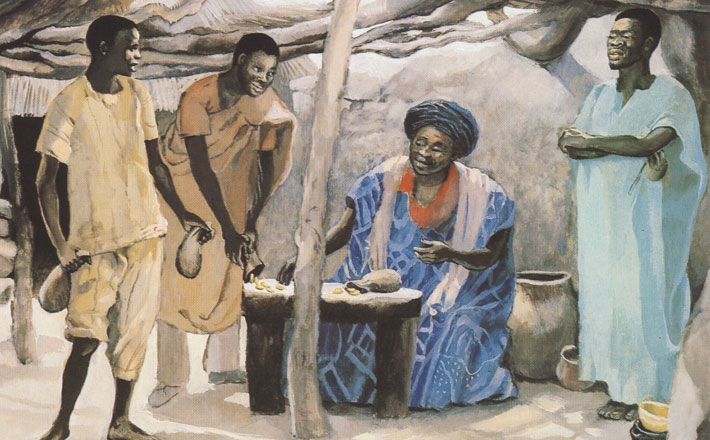Commentary on 1 Thessalonians 5:1-11
When Paul speaks about eschatology — how everything will happen at the end of time — he does so in order to bring comfort to his congregations.
In 1 Thessalonians 4:18 and 5:1, at the bookends of this passage, he says so explicitly: comfort one another with these words. These teachings are meant to be a comfort and an encouragement for believers who are already doing the right thing, eagerly waiting for Jesus’ return (1:10).
This eager anticipation translates into another reason that calls forth Paul’s praise: the Thessalonians correctly discern the times and seasons. They know that the day of the Lord will come as a thief in the night, as other early believers did (2 Peter 3:10; Revelation 3:32). They had not forgotten Jesus’ instructions preserved in both Matthew 24 and Luke 12.
Although Paul does not explicitly reproduce the material in the gospels frequently, this section of Thessalonians provides clear indication that Jesus’ teaching was part of Paul’s own. Labor pains, being surprised, destruction following pronouncements of peace and safety, and the charge to stay alert all figure in Jesus’ Olivet discourse. The Thessalonians knew what to look for because they knew what Jesus and then Paul had said about the end.
Consequently, for them, Jesus’ coming wouldn’t be like the surprise attack of a thief in the night at all. Because for them it is not night; it is day. Even more powerfully, Paul says that they are children of the light and of the day. They aren’t just walking around in the daylight; it is part of their identity. They are light people and day people free from the fear, uncertainty, and insecurity of night and darkness.
So Paul, as he so often does in his ethical sections, encourages them to “be who they are.” Since they are children of the daylight, it only makes sense that they would not sleep. He has been discussing those who had “fallen asleep” in their community (4:13–17), as a euphemism for death, but now he employs a different word that carries the connotations of moral dullness. Instead of this kind of sleepiness they should be alert and sober.
Sobriety is exactly what Paul is aiming at because in the next verse, he makes a connection between sleeping at night and getting drunk at night. In the first century world, many of the religious options of the day included nocturnal celebrations that included alcohol and sexual promiscuity.
Dionysus, the god of wine, was worshipped in Thessalonica, and his nighttime celebrations had the reputation of being frenzied, ecstatic, orgiastic events. The Thessalonians, being called from the worship of dead idols to serve the living God (1:9), no longer should participate in such events. Instead of being unclothed they are to put on the specific clothing readying them for battle.
The juxtaposed images of revelers verses soldiers provide a stark contrast. Paul urges his congregation to gird their chests and heads for battle, a reminder that he considers their spiritual lives with utmost intensity. With the vital organs protected, the Thessalonians could live with emotions protected by faith and love, and thoughts shielded by the hope of salvation. Again, Paul is only encouraging them to continue practicing what they are already doing, as he has expressed prayerful thanksgiving for their faith, love, and hope (1:3).
Paul could have chosen only these two pieces of armor, unlike the full collection described in Ephesians 6:10–18, as an echo of the description of God’s armor as the divine warrior in Isa 59:17. The likelihood of this allusion increases with the next verse that makes a distinction between God appointing some for wrath and some for the obtaining of salvation. In Isaiah 59, God dons his armor to defend his people and bring them justice (See also Wisdom 5, where God does the same). Having left the lifestyle of idolatry, the members of this congregation no longer stand under God’s wrath, but only look forward to salvation.
Paul comes full circle with the last two verses, drawing to a close his entire eschatological discussion that began in 4:13. Jesus is the one who has died, Paul says, on our behalf. Because he experienced death, the Thessalonians can be confident that they will experience life. Whether they are awake or whether they are asleep, as members of Christ, their eternal life is already guaranteed. Paul has at least three connotations for sleeping here. As in chapter 4, if someone dies, they will still get to meet Christ upon his return.
If they are physically sleeping when he returns, that won’t disqualify them. And, finally, because he uses the same word for sleeping that he used in verse 6, it seems that even if they, on rare occasion, fall into the sins of the night, even then, their life with Christ will remain. That is not to say that a constant lifestyle of sin wouldn’t be a cause for grave concern and doubt about the validity of one’s faith (1 Corinthians 6:9–10; Galatians 5:19-21), but Paul’s encouragement is that Christ’s death has vanquished the night and all its fears and dangers.
Christ’s guaranteed return and their status as people of the day should serve as words of encouragement for them. They have nothing to fear when the master returns to the house but should use the promise of his return to excel still more. Paul says they are already encouraging one another with this hope.
Either that is a piece of exhortative rhetoric or the reality on the ground, but either way, it is instructive to see how Paul uses eschatology. For those who are already on the winning team, Jesus’ second coming is a cause for celebration not dismay. Light comprehends the light in a way that darkness does not (John 1:5), so the day of the Lord for those of the day is only the culmination of the life they are already living.


November 16, 2014